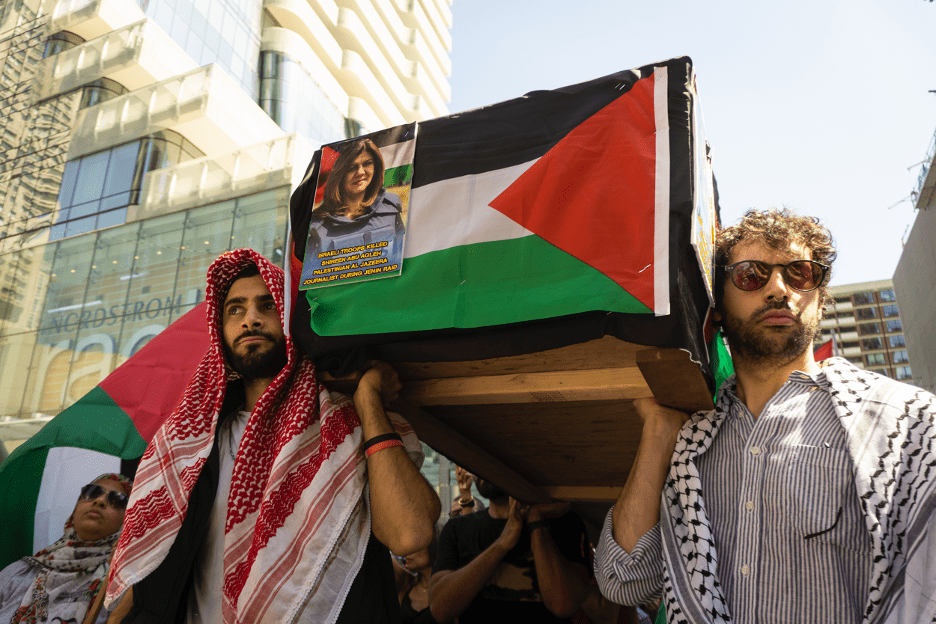On May 15, Palestinians and their allies marched through downtown Toronto to commemorate the 74th anniversary of Nakba. The crowd first gathered at Yonge-Dundas square to unroll a large Palestinian flag and hear speeches. It then set out north on Yonge Street. At the head of the crowd, three organizers stood in the back of a slow-moving white pickup truck, using a microphone to lead chants. The march paused outside the Consulate General of Israel in Toronto, where the crowd heard more speeches before looping back down Bay Street toward the event’s starting point.
According to The Atlantic, Palestinians’ “collective social, political, and historical identity centres almost entirely around the shattering experience of the nakba.” Nakba means “catastrophe” in Arabic, and refers to the mass expulsion of at least 750,000 Palestinians from their homes during the 1948 Arab-Israeli war.
Decades later, Israel continues to illegally occupy Palestininans’ ancestral lands, and prevents Palestinians and their descendants from returning. As a result, they remain displaced and stateless; today, the United Nations recognizes around five million Palestinians as refugees. Nearly one third of those refugees live in registered refugee camps located in neighbouring countries, which generally have poor socio-economic conditions and inadequate infrastructure.
Among the sea of Palestinian flags, march attendees also held signs referencing Al Jazeera reporter Shireen Abu Aqleh, who had been shot dead several days prior while wearing a vest that clearly identified her as press. Israeli troops claim that it is unclear who fired the shot that killed Aqleh, while a Palestinian investigation concluded that Israeli forces were responsible. Similar investigations conducted by CNN, The New York Times, and The Washington Post found that there were no armed Palestinian militants on the street when she was shot.
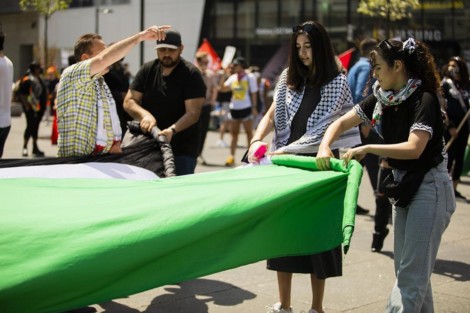
At Yonge-Dundas square, several people help unroll a large Palestinian flag, which at least a dozen attendees help hold aloft. CAROLINE BELLAMY/ THE VARSITY
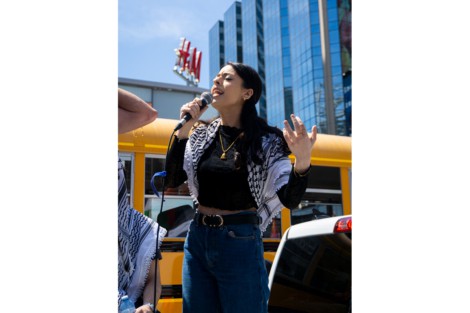
One protest organizer, standing in a truck bed, leads the growing crowd in several chants. JADINE NGAN/ THE VARSITY
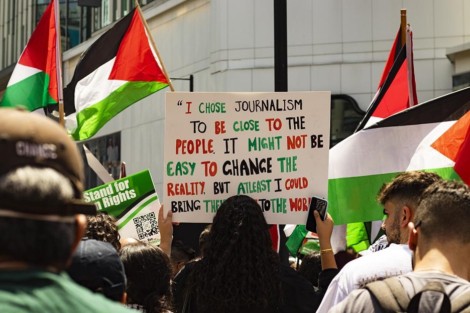
A protester holds a sign with a quote from Aqleh, in which the veteran journalist explains the motivation behind her work. Aqleh was shot at 6:30 am on May 11 outside of Jenin Refugee Camp, where she was slated to cover an Israeli raid that was happening that day. CAROLINE BELLAMY/ THE VARSITY
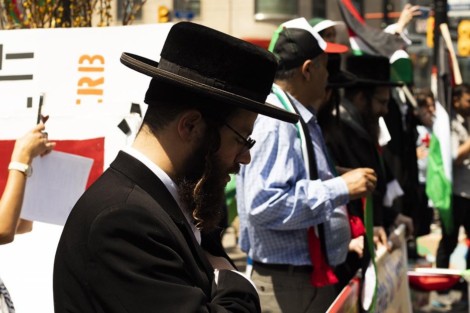
Several Orthodox Jews are also in attendance, carrying a flag that read “Jews Mourn 76 Years Existence of Israel.”CAROLINE BELLAMY/ THE VARSITY
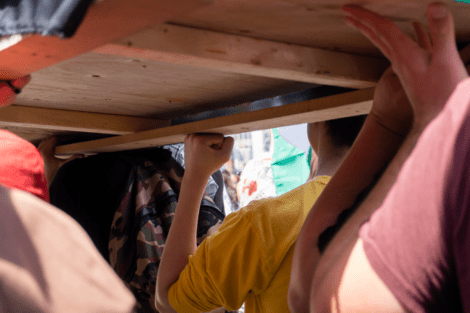
As the march leaves Yonge-Dundas square, several people carry a wooden coffin symbolic of Aqleh’s funeral procession. During the procession, Israeli forces had attacked Aqleh’s coffin bearers, causing her coffin to briefly fall to the ground. JADINE NGAN/ THE VARSITY
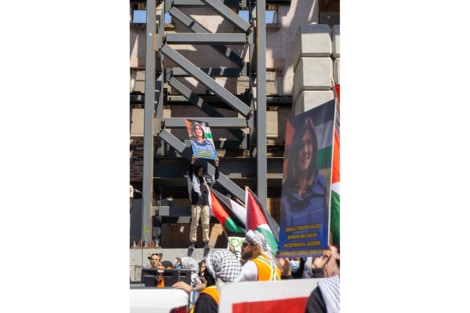
A young protester climbs atop scaffolding on Yonge Street to hoist a sign in honour of Aqleh. The sign mirrors another one held up in the passing crowd of protestors. JADINE NGAN/ THE VARSITY
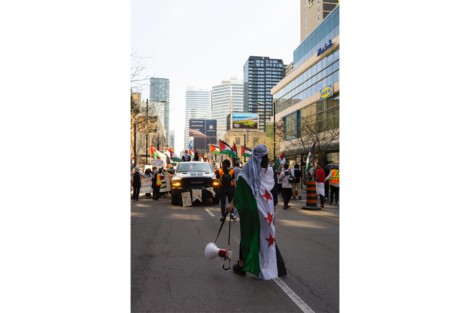
Ahead of the crowd, one protestor — wearing a Syrian flag and a Palestinian keffiyeh — turns to look back at the approaching pickup truck. JADINE NGAN/ THE VARSITY
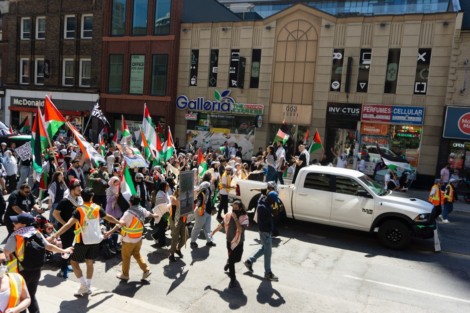
As the march slowly progresses up Yonge Street, marshals in safety vests keep the crowd behind the organizers’ pickup truck. JADINE NGAN/ THE VARSITY
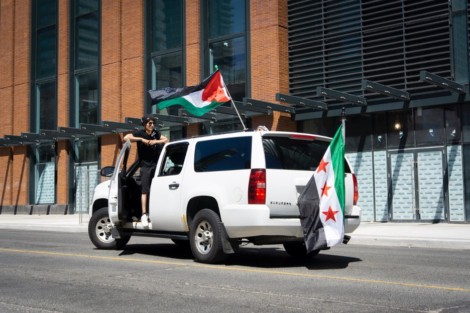
Several people drive ahead of the protest in a white Suburban, flying both a Syrian flag and a Palestinian flag. Here, they stop for a moment to look back at the crowd. JADINE NGAN/ THE VARSITY
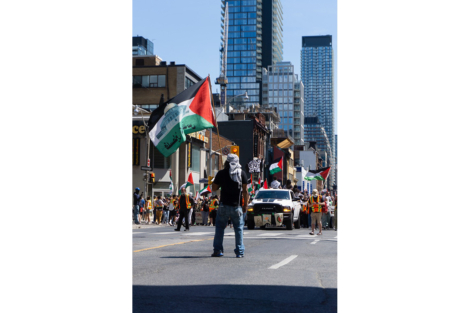
Another protestor in a keffiyeh flies a flag displaying al-Aqsa mosque, which is Islam’s third-holiest site. Al Jazeera writes that it sits on “the most contested piece of territory in the Holy Land since Israel occupied East Jerusalem.” JADINE NGAN/ THE VARSITY
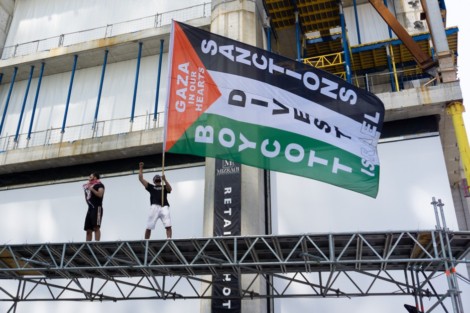
The Boycott, Divestment and Sanctions (BDS) movement is a Palestinian-led movement established in 2005, which has roots in South Africa’s anti-Apartheid movement. It seeks to end international support for Israel and pressure Israel to end the occupation of Palestine. JADINE NGAN/ THE VARSITY
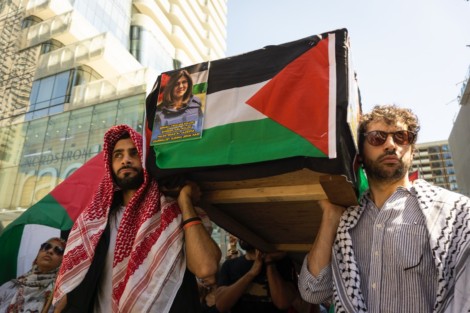
Two casket bearers, standing at the intersection where the Consulate General of Israel is located, listen as speakers call for justice for Palestine. “You steal my land, you destroy my house, burn my olive trees, kill my mother, bomb my country — but I’m to blame, I shot a rocket back,” one child says into the microphone. “Free, free Palestine.” JADINE NGAN/ THE VARSITY

